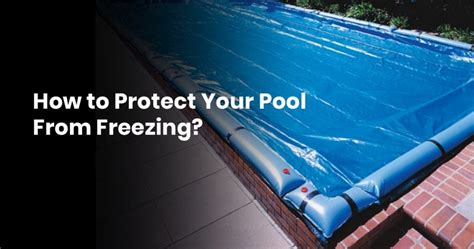Pool Freeze Prevention: A Step-by-Step Guide
Winter's icy grip can wreak havoc on your swimming pool, causing costly damage if preventative measures aren't taken. Freezing temperatures can crack pool walls, damage plumbing, and even destroy your pump and filter. This comprehensive guide provides a step-by-step approach to pool freeze prevention, ensuring your pool survives the winter unscathed.
Understanding the Risks of Freezing
Before diving into preventative measures, let's understand why freezing is so damaging. Water expands when it freezes, exerting immense pressure on the pool structure and its components. This pressure can crack concrete walls, break pipes, and damage the filter system. The severity of the damage depends on several factors, including the intensity and duration of the freeze, the type of pool, and the effectiveness of your preventative measures.
Preparing Your Pool for Winter: A Step-by-Step Guide
This section outlines the crucial steps to winterize your pool and prevent freezing damage.
1. Lower the Water Level
Lowering the water level by a few inches provides crucial space for expansion during freezing. This reduces the pressure on the pool walls and minimizes the risk of cracking.
2. Clean Your Pool Thoroughly
A clean pool is a healthy pool, especially during winter. Remove all debris, leaves, and algae to prevent contamination and ensure smooth water circulation during the winterizing process.
3. Balance Your Pool Water Chemistry
Proper water chemistry is vital for preventing damage during freezing. Ensure your pH, alkalinity, and sanitizer levels are within the recommended range. Improper chemical balance can exacerbate the damage caused by freezing.
4. Shock Your Pool
Shocking your pool eliminates any remaining algae or bacteria. This prevents contamination and reduces the likelihood of damage from chemical imbalances during the winter months.
5. Winterize Your Pool Equipment
This is a crucial step. Properly winterizing your equipment protects your investment from freezing damage. This typically involves:
- Draining and blowing out all water lines: Removing all water from the plumbing system prevents it from freezing and expanding.
- Removing the pump and filter: Store these components indoors to protect them from the elements.
- Protecting above-ground pool equipment: Cover or protect your equipment from exposure to snow and ice.
6. Cover Your Pool
Using a high-quality pool cover is essential for preventing freezing. Pool covers provide insulation, reducing the temperature fluctuations within the pool and protecting the water from freezing. Ensure your cover is securely fastened to prevent debris and snow accumulation.
Additional Freeze Prevention Methods
Beyond the basic steps, consider these additional measures for extra protection:
Using Pool Heaters
For milder climates or occasional freezes, a pool heater can maintain a safe water temperature above freezing. However, this is not a standalone solution and should be used in conjunction with other preventative measures.
Adding Air Bubbles
Air blowers, available for in-ground pools, create air pockets within the water, reducing the likelihood of complete freezing. This is particularly helpful in areas with shallow water.
Using Pool Freeze Protectors
These chemical additives lower the water's freezing point, making it less susceptible to damage from expansion. Always follow the manufacturer's instructions carefully.
What to Do If Your Pool Freezes
Despite your best efforts, freezing can still occur. If you notice ice forming on your pool's surface, act quickly. Never attempt to break the ice yourself. This can cause significant damage to your pool. Instead, contact a qualified pool professional to address the situation safely and effectively. They can help minimize damage and prevent further problems.
FAQs
1. How do I know if my pool is at risk of freezing? Your pool is at risk if temperatures are consistently below freezing (32°F or 0°C) for extended periods.
2. Can I use antifreeze in my pool to prevent freezing? Using automotive antifreeze in your pool is extremely dangerous and can severely damage your pool and contaminate the water. Do not use it. Pool-specific freeze protectors are available, but using them along with other preventative measures is still recommended.
3. How often should I check my pool during winter? Regularly checking your pool, especially during periods of freezing temperatures, is highly recommended. Look for signs of ice, water level changes, and any signs of damage.
4. How much does it cost to winterize a pool? The cost varies depending on the size of your pool, the type of equipment, and the labor required.
5. What type of pool cover is best for freeze protection? A high-quality, heavy-duty pool cover designed for winter use provides the best protection against freezing.
By following this comprehensive guide, you can significantly reduce the risk of freeze damage to your pool, ensuring it's ready for enjoyable swimming when warmer weather returns. Remember, prevention is key, and proactive measures are far more cost-effective than repairing freeze damage.

